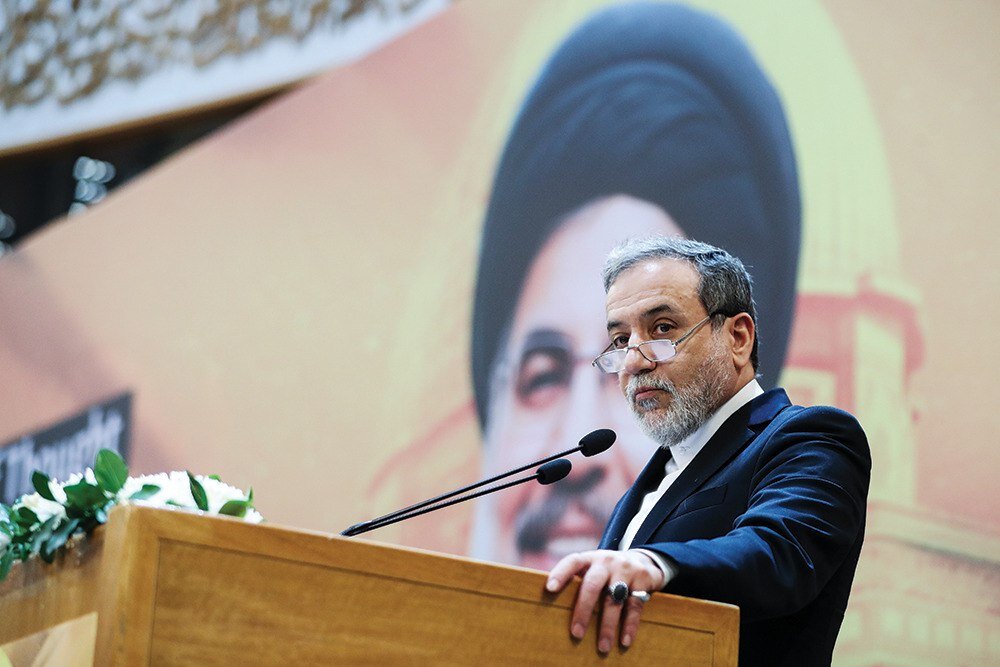Warning Issued
Warning Issued
TEHRAN – Iranian Foreign Minister Abbas Araghchi cautioned on Saturday that the intense violence impacting Gaza and southern Lebanon, fueled by Israeli military actions, may extend far beyond West Asia.

He warned that the effects of this escalating crisis could reverberate across regions well outside West Asia if the current course continues unchecked.
Araghchi delivered his remarks during an international conference entitled "Nasrallah’s School of Thought" held in Tehran to honor the 40th day of mourning for Sayyed Hassan Nasrallah, the leader of the Lebanese Hezbollah movement.
The summit gathered Iranian political leaders and foreign experts, creating a platform for discussions on regional stability and resistance to foreign intervention.
In his address, Araghchi condemned Israel as an "apartheid and child-killing regime" that has consistently dismissed all attempts to establish a ceasefire in Gaza and Lebanon.
He criticized the international community for failing to act decisively, suggesting that it has either turned a blind eye or stood by as Israel intensifies its offensive against Palestinian and Lebanese civilians.
Araghchi emphasized that a just ceasefire should be a top priority for global leaders. He called on the United Nations and other international bodies to adopt impartial policies that prioritize justice and peace, urging them to uphold their responsibilities in securing international stability.
Reflecting on the legacy of Nasrallah, whom he described as a symbol of resistance and courage, Araghchi noted that the Hezbollah leader had long advocated for multilateral cooperation to counter the "genocidal" actions of the Zionist regime.
The minister expressed that Nasrallah had been dedicated to challenging these forces to defend the rights of oppressed peoples.
Araghchi also raised concerns over Israel's "hybrid warfare" tactics, which include military strikes, intelligence operations, and efforts to sow discord among various religious and ethnic communities in Lebanon.
He urged the Muslim world to build internal solidarity and strengthen regional alliances as means of defense against such threats. Lebanon’s ability to resist, he suggested, lies in its diverse society united by common goals of peace and justice.
In recent months, Hezbollah has conducted hundreds of retaliatory strikes against the occupied territories, marking its opposition to Israel’s intensified military actions in Gaza and Lebanon. The violent escalation, which has led to the deaths of over 43,000 Palestinians, mostly women and children, has also claimed more than 3,000 Lebanese lives. Hezbollah has pledged to maintain its resistance in response to these attacks, continuing its operations as long as hostilities against Lebanon and Gaza persist.
Compromise with Israel unattainable following Nasrallah’s martyrdom: Qalibaf
At the same memorial event, Iranian Parliament Speaker Mohammad Baqer Qalibaf reflected on Nasrallah’s legacy, emphasizing that his martyrdom serves as a testament to the futility of compromise with Israel.
Qalibaf described Nasrallah as a "wise and resolute leader" who unified Lebanon's Shia community around shared ideals of resistance and coexistence with other groups, transforming Hezbollah from a military faction into a strategic force for both Lebanese and regional interests.
Qalibaf highlighted Nasrallah’s role in supporting the Palestinian cause, underscoring Ayatollah Khamenei’s sentiment that every blow against Israel contributes to global justice.
He praised Nasrallah’s efforts in uniting Hezbollah with broader humanitarian objectives and emphasized that Hezbollah remains rooted in principles of defending the oppressed and fostering unity across Muslim nations.
Qalibaf also noted Hezbollah’s critical role in combating Daesh (ISIS), stating that Nasrallah’s leadership helped neutralize a global threat, creating a safer world, particularly for Europe. He criticized the United States for undermining Hezbollah, contending that the West's antagonism toward Hezbollah compromises regional stability. In his view, Hezbollah has emerged as a force that deters violence rather than incites it.
Amid ongoing hostilities, Israel’s strategic failures have become evident, Qalibaf argued, as its forces continue to grapple with resistance. "Despite the martyrdom of Hezbollah’s leaders, including Sayyed Abbas al-Musawi and Sayyed Hassan Nasrallah, the movement remains resilient and united in its pursuit of justice, peace, and regional security," he concluded.
Additionally, Mohammad Javad Zarif, the strategic adviser to President Masoud Pezeshkian, emphasized Hezbollah’s resilience and Israel’s precarious future, stating, “Hezbollah lives on, and Israel will not know peace until Palestinian lands are fully liberated.”
Also present in the event, Iran’s Minister of Culture and Islamic Guidance, Seyyed Abbas Salehi, paid homage to the memory of Sayyed Hassan Nasrallah, lauding him as a “remarkable and unique leader.”
“Nasrallah’s legacy is one of balancing high ideals with practical realities,” Salehi remarked, pointing out that the Hezbollah leader fiercely advocated for Lebanon’s sovereignty while also leading a broader Islamic resistance. Salehi noted Nasrallah’s deep commitment to both Lebanon and the wider regional cause, a balance he deemed rare and exemplary.
The Iranian leadership’s remarks at the conference emphasized the impact of Nasrallah’s legacy on Hezbollah’s continued commitment to resistance and underscored the belief that his vision of unity and justice will inspire future efforts to confront regional instability and aggression.
source: tehrantimes.com